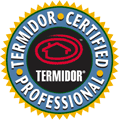Hot Topics:
Flying Insects
If you see flying insects inside your house during the springtime, they are most likely subterranean termites. Call us for a free inspection to identify them. Termites are often look like flying ants.
Find out more about local Pest Control
Explore the Pest Control World
Read about Pesticide Labels
and Pesticide MSDS Sheets
|
|

|
Frequently Asked Questions About Termite Inspections
|
|
Q. Why do I need a termite inspection?
A. Many lenders require it, so they can be sure there are no active termite infestations in any home they finance. If you're buying, you want to be sure you're not buying termites and termite damage along with your new house.
Q. How long does the inspection take? What's involved?
A. Usually, it takes less than an hour. An experienced inspector will check the entire house thoroughly, from foundation to roof. He knows exactly where to look for telltale signs of the presence of termites or other wood destroying insects, and any damage.
Q. Termites won't attack a new house, will they?
A. Unfortunately, they have been known to... sometimes within days of completion.
Q. How do subterranean termites get into a house?
A. Very easily. All they need is an opening 1/64" wide. They may enter directly from the soil, or they may build airtight tubes leading from their colony in the soil to the wood of your house. They usually commute daily between the wood and their colony.
Q. What if no evidence of termites is found?
A. You will receive written notification stating that no visible evidence of infestation have been found in the accessible areas that were checked. But any home should be reinspected periodically, especially if neighboring homes show signs of termites.
Q. Are there other wood destroying insects besides termites?
A. Yes. Besides the most common termite - the subterranean - there are other kinds of termites, as well as wood destroying beetles, carpenter ants and carpenter bees. Our inspectors know how to identify them and treat for them.
Q. What if the inspection shows termites or other wood destroying insects are present?
A. Then it will be necessary to treat the property to prevent any further damage.
Q. Will my family have to vacate the house?
A. Only if it is necessary to treat for drywood termites. Subterranean termites can be controlled while the house is occupied. Again, our inspector will carefully explain whatever procedures are necessary.
Q. Will there be an odor?
A. There may be a slight odor for a while after some treatments. However, it is non-lingering, and any trace of it should disappear in just a few days.
Q. If a treatment is needed, what might be the cost?
A. Costs vary widely, and no meaningful answer can be given until the inspection is completed, the size and structure of the home determined, and other factors assessed. It is important to remember, however, that the cost of termite treatment is minor when compared to the equity and investment represented in a home.
Q. Could I do it myself?
A. That's not practical, since special equipment and application techniques are required. Thoroughly trained and experienced personnel have the skills necessary to do the job properly.
Q. What if there already is extensive damage?
A. If the damage threatens the soundness or appearance of the structure, it must be repaired. This is a specialized type of work, but our inspectors are familiar with it and can help you arrange for repairs.
Q. What does an inspector look for during a termite inspection?
A. A full termite inspection is technically a "Wood Destroying Organism Report". The inspector will be looking for active infection or infestation. Some things an inspector will look for are: termites, wood boring beetles, fungus damage, water damage, earth to wood contacts and plumbing leaks.
|
The California Structural Pest Control Board would like us to inform you that while we offer a number of ways to eliminate drywood termites and wood boring beetles due to recent advances in pesticides, the only sure way to eliminate every last insect is to fumigate the structure. While we can arrange to have your building fumigated, the actual fumigation is subcontracted to another pest control company, most likely Nor-Cal Pest Control, a wholesale Sacramento pest control company that performs fumigations in Sacramento and the neighboring counties of Northern California.
|

Click above to verify our license with the California Structural Pest Control Board, a division of the California Department of Consumer Affairs.
Our license number is
PR3235 and was issued in 1998.
The Pest Control Board verifies that we are bonded and carry liability insurance.

|
|